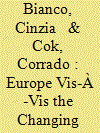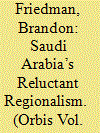|
|
|
Sort Order |
|
|
|
Items / Page
|
|
|
|
|
|
|
| Srl | Item |
| 1 |
ID:
192585


|
|
|
|
|
| Summary/Abstract |
Europe’s relations with the states of the Middle East and North Africa (MENA) are facing a critical juncture. When looking at a regional security architecture, Europe’s overarching interest is stability as it prevents conflict and state vacuums from menacing trade and energy supply routes, creating safe havens for terrorist organizations or hostile powers and fueling refugee flows toward Europe. However, compared to the past, European actors are confronted with a sharply new scenario in MENA that challenges these interests, given a progressive retrenchment of the United States, the rise of China, and MENA actors playing a more assertive role in regional politics and conflicts. The February 2022 Russian invasion of Ukraine is further accelerating these trends. Against this shifting background, MENA countries have intensified efforts to diversify their partnerships with rising global and regional players. European actors still struggle to come to grip with the multipolar scenario in the making—and to design an appropriate strategy to respond.
|
|
|
|
|
|
|
|
|
|
|
|
|
|
|
|
| 2 |
ID:
192587


|
|
|
| 3 |
ID:
192583


|
|
|
|
|
| Summary/Abstract |
The Middle East has undergone significant changes in the past two decades. Most significantly, the region has experienced the dissolution of the post-1991 America-centric regional security complex as the United States reduces its forces and retools its center of effort toward the Indo-Pacific, and the creation of a new gas-centered sub-regional security complex in the Eastern Mediterranean. These changes have impacted Israel’s stature in its region and have led to significant changes in Israel’s foreign and national security policy. While in the past, Israel viewed itself as a “villa in the jungle”—not as an integral part of the region—it now sees itself as part of its surroundings and is pursuing a much more regional-centric policy. This change is clear in issue-specific alliances and collective security arrangements, as well as in long-range economic relationships. This article analyzes the regional changes and their impact in Israeli strategic thinking and policy.
|
|
|
|
|
|
|
|
|
|
|
|
|
|
|
|
| 4 |
ID:
192582


|
|
|
|
|
| Summary/Abstract |
This article argues that Jordan should advocate for transforming the Abraham Accords’ regional integration initiatives into a regional security architecture that brings prosperity and security to all its members—including the Palestinians. Jordan is well positioned to influence the Accords’ strategic planners given its credibility, diplomatic assets, and strategic location; it will continue to be a lynchpin in regional security and future integration plans.
|
|
|
|
|
|
|
|
|
|
|
|
|
|
|
|
| 5 |
ID:
192584


|
|
|
|
|
| Summary/Abstract |
Even before normalization—in December 2020, under the auspices of the United States—Israel and Morocco had had “normal” relations for 2,500 years. Morocco has always been a homeland for the Jews, but also a sacred place where many of their saints are buried. Muslims and Jews have lived in Morocco for centuries in peace, mutual respect, and care. This mutual understanding of the past, with its rich cultural heritage, translates today into a friendship without equal. Morocco and Israel are moving into the future hand in hand to write new chapters of understanding, harmony, and human development.
|
|
|
|
|
|
|
|
|
|
|
|
|
|
|
|
| 6 |
ID:
192589


|
|
|
|
|
| Summary/Abstract |
Yet Washington’s views too often reflect the same blinkered approach to Central and Eastern Europe as is common in Brussels, Paris, and Berlin. Despite an American historiography that credits Woodrow Wilson for liberating these countries following World War One, for example, the Czechs and Slovaks played key roles in their own liberation, including seizing the entire Trans-Siberian Railway in an attempt to re-open the Eastern Front and waging a vigorous global political campaign to persuade
|
|
|
|
|
|
|
|
|
|
|
|
|
|
|
|
| 7 |
ID:
192580


|
|
|
|
|
| Summary/Abstract |
Saudi Arabia’s turn to regionalism during the past three years, principally in partnership with Egypt, is an expression of both its weakness and its power. Its role as the world’s swing producer in the global oil markets makes it an international power. This economic power, in turn, has allowed the Kingdom to help stabilize weaker economies in the region, like Egypt, that have been hard hit by global recession, inflation, and food insecurity. On the other hand, its military failure in Yemen and the US’s attenuating security commitment have forced it to build regional and inter-regional partnerships for protection and defense. Under the leadership of Crown Prince Mohammed bin Salman (MbS), Saudi Arabia would prefer to impose its will on the region without having to build a regional consensus for its initiatives. But its lack of independent military power has constrained the Kingdom. The Saudi-Egyptian partnership therefore represents a mutual recognition of the limits of their respective power. It also raises the question not merely about who leads whom, but whether the carefully cultivated interdependency between them will hold.
|
|
|
|
|
|
|
|
|
|
|
|
|
|
|
|
| 8 |
ID:
192588


|
|
|
| 9 |
ID:
192586


|
|
|
|
|
| Summary/Abstract |
US Secretary of State Antony Blinken recently reiterated US support for the expansion of the Abraham Accords and called for renewed Israeli-Palestinian negotiations. As highlighted by this volume’s authors, the Accords are the most significant regional peacemaking achievement in decades, having already reduced Arab-Israeli tensions—particularly at the government level—and provided opportunities for Arab states to mediate between Israel and the Palestinians. The changing regional security architecture can only be welcomed by the United States. Yet, due to political authoritarianism in the region, the Accords may fall short of their potential if the economic gains fail to reach marginalized populations. This essay contends that trade relations that support job creation and access to water and energy may increase public support. Just as a return to Israeli-Palestinian negotiations is important, political reform in the Arab countries is needed to make the Accords successful by bringing more economic benefits to the Arab streets and ensuring that there will not be a “Cold Peace.”
|
|
|
|
|
|
|
|
|
|
|
|
|
|
|
|
| 10 |
ID:
192581


|
|
|
|
|
| Summary/Abstract |
Developing an effective security architecture for the Middle East region is a complex problem that is facilitated by the production of pertinent scholarly research. Homegrown research is especially important, as it is more likely to feature the requisite nuanced understanding of local issues than is external research. Based on a small dataset, this paper makes the suggestive argument that at present, the academic literature on Middle East security is dominated by external research, and the limited volume of homegrown research is of lower quality than that produced externally. This state of affairs constitutes an obstacle to the formulation of a sustainable and effective Middle East security architecture. Consequently, policymakers should consider ways of boosting homegrown research on Middle East security.
|
|
|
|
|
|
|
|
|
|
|
|
|
|
|
|
|
|
|
|
|